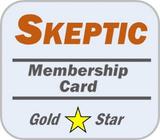Con: Skeptic
Back to listingViewpoint Against Christianity

“I often grapple with the concept of God’s existence, but I recognize that historians and even many atheists recognize that a man named Jesus actually walked the earth 2,000 years ago. But how can one conclusively affirm that God is real, and that this guy Jesus was—and is—the eternal Son of God? That he changed water into wine, really died, and yet bodily rose from the dead three days later? How can one ascertain these claims, with resolute confidence that they’re true? Yes, maybe I’m a “doubting Thomas” and a natural skeptic, but I’ll need exceptionally strong evidence to make such a life-altering decision."
Background Discussion
Are you an inherent skeptic, grappling with the important questions in life, and wary of cookie-cutter solutions from those who have “all the answers.”? Christians are often accused of having one-size-fits-all solutions for life’s fundamental questions and problems. How can a religion and ancient documents answer our most important questions about life, especially when they extol self-denying philosophies and proclaim miracles like the blind seeing for the first time and the dead and buried being brought back to life? There’s so much to study, understand, and accept; and many of us are already overloaded with important life altering decisions that rationally demand our attention. So, the prospect of trusting in Jesus may be overwhelming and, ultimately, a decision with too much potential downside, including losing friends, family, and colleagues at work (see Con “Fear and Ridicule” section).

Doubts are an inherent part of human existence; however, some of us have more than others. An intuitive personality might acknowledge God’s existence simply by marveling at the stellar tapestry on a clear winter night. In contrast, the natural skeptic is often burdened with doubts that require intense analysis requiring enormous amounts of evidence—and which often yield inconclusive results. Fyodor Dostoevsky, the renowned 19th-century Russian novelist, could personally relate to this subject of skepticism and faith when he stated: “It is not as a child that I believe and confess Jesus Christ,” he said. “My hosanna is born of a furnace of doubt.” Apparently, there can be hope for the skeptic, including those with serious doubts.
We’re all familiar with the Bible story of how “doubting Thomas” wouldn’t believe until he saw the risen Jesus. C. S. Lewis, a famous 20th-century writer, doubted God’s existence for decades, and needed even more time and evidence to accept Jesus as Christian’s profess Him to be. Antony Flew, a renowned atheist and philosopher, argued against God’s existence for decades. At the age of 81, he “changed his mind”, acknowledging that the ordered nature of the universe points to an Intelligence that brought it into being.
There is room for the skeptical “believer” in the Christian story. Are you willing to crack open the door of your mind for simply a sliver of light to enter that could transform your life? If you might be a skeptic, the information presented here (“Skeptic” section) might nudge you into acknowledging the Creator and his Son. At your own pace, consider the compelling evidence for God’s existence (see Con: “God vs Science”) and Jesus as the Savior of the world (Pro: “Jesus is Unique”). Many skeptics, including those who have earned Ph.D.’s and won Nobel prizes in science, have, after careful examination of the evidence and with thoughtful introspection, chosen to play their part in the Christian story.
Please click on the links to videos, documents, quotes, and books regarding further reference to skepticism, doubt, and Christianity. If you haven’t already, please consider making the Christian Decision. This may be the most important decision not only of your life here on earth, but also for an everlasting “afterlife.”
There's so much more!
You're asking the right questions, and now you want to dig a little deeper.
